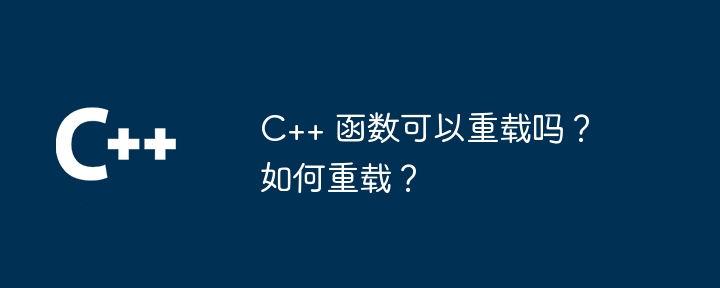
Function overloading allows the creation of multiple functions with the same name but different parameter lists in a class or structure, providing specific behaviors for different parameter combinations. The syntax is as follows: define the return type, function name and first parameter list. Define the return type, function name, and second parameter list. You can continue to define more overloaded functions with different parameter lists.

C Function Overloading: Definition, Syntax and Practice
Definition
Function overloading allows the creation of multiple functions with the same name but different signatures (different parameter lists) in a class or structure. Each overloaded function will provide specific behavior for different combinations of arguments.
Syntax
The syntax of function overloading is as follows:
return_type function_name(parameter_list_1); return_type function_name(parameter_list_2); ... return_type function_name(parameter_list_n);
Among them:
return_typeis the return type of the function.function_nameis the name of the function.parameter_list_iis the parameter list of the i-th overloaded function.Practical case
Consider the following example:
#includeusing namespace std; // 计算圆的面积 double area(double radius) { return 3.14 * radius * radius; } // 计算矩形的面积 double area(double length, double width) { return length * width; } int main() { cout << "圆的面积: " << area(5) << endl; cout << "矩形的面积: " << area(5, 10) << endl; return 0; }
In this example, we define twoareaFunction overloading:
area(double radius): Calculate the area of a circle, accepting a double parameter (radius).area(double length, double width): Calculate the area of the rectangle, accepting two double parameters (length and width).mainfunction calls these two overloaded functions. Because the number and types of arguments differ, the compiler can tell whichareafunction overload should be called.
The above is the detailed content of Can C++ functions be overloaded? How to reload?. For more information, please follow other related articles on the PHP Chinese website!
 What are the differences between c++ and c language
What are the differences between c++ and c language Recommended learning order for c++ and python
Recommended learning order for c++ and python Cost-effectiveness analysis of learning python and c++
Cost-effectiveness analysis of learning python and c++ Is c language the same as c++?
Is c language the same as c++? Which is better to learn first, c language or c++?
Which is better to learn first, c language or c++? The difference and connection between c language and c++
The difference and connection between c language and c++ C++ software Chinese change tutorial
C++ software Chinese change tutorial Cost-effectiveness analysis of learning python, java and c++
Cost-effectiveness analysis of learning python, java and c++



